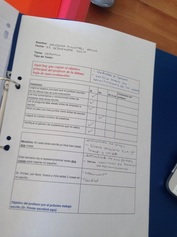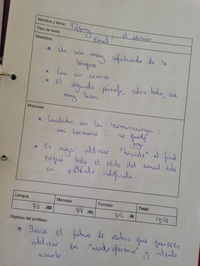
One thing that can be a challenge to us as teachers is that many of us have a different meaning for the word "feedback". In Geoff Petty's (2007) book - "Evidence Based Teaching" he breaks feedback down into three distinctive parts that I have found to be highly effective in my classes:
1. Where am I going? (Goal) - Feed up - Clear and challenging criteria
2. How am I going? (Medal) - Feed back - Informative comments; Process (how) as well as product (what)
3. Where to next? (Mission) - Feed forward - Challenging but achievable clear targets based on last piece of work
Right now of course most teachers reading this are saying "this is all well and good, but when am I supposed to find time to give this kind of detailed feedback to each learner?". Yes, you are right. It can take time to furnish your students with the high quality detailed feedback they need but I think I may have found a way to at least put us on the right track
 Proforma
Proforma When students submit a piece of writing they must first complete a self assessment sheet (or a 'proforma') answering questions like "I achieved the teachers objective", "I made 3 clear points" or "I made a plan before starting". Immediately there is some accountability on their behalf and they know that if they didn't answer yes to all the questions then they may not achieve the grade they thought it was worth.
The 'teachers objective' is the 1 or maximum 2 specific language focused goals I gave them after their last piece of writing. It can be as specific as "Use the phrase..." or it could be based on format like "include a title". This specific, achievable and realistic goal moves the learner forward. At the end of the proforma I will then give them a new objective for their next piece of writing which they copy on to their next proforma and so the loop continues.
 Medals & Missions
Medals & Missions The final part of the process is the "medals and missions" sheet I complete for them. Once again, I ensure I only give them feedback on the items they asked for. Medals are things I like and that they are doing well. Missions are areas to improve on. All specifically related to what they asked me to look for. You can be sure that once you give them this kind of feedback and they do their corrections they will give you something different to look at next time as they feel they have mastered this part, or they might ask you to look at it again if it wasn't very good the last time. The key in all this is that the student is negotiating the feedback and correction process with you. They feel like they are receiving the guidance they need and you have less corrections to do! Everyone is a winner!

 RSS Feed
RSS Feed